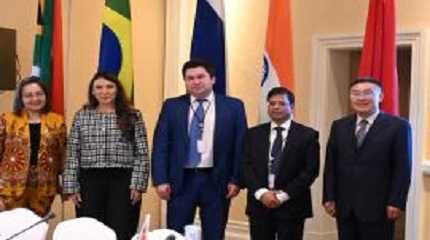
CAPE TOWN, Oct 25 (NNN-AGENCIES) — South African Tourism Minister, Patricia de Lille, says the BRICS partnership is enough reason for Tourism Ministers and countries to come together and work in collaboration to grow their sectors and economies.
De Lille made the remarks during the opening session of the BRICS (Brazil, Russia, India, China, and South Africa) Tourism Ministers meeting held in Cape Town on Tuesday.
Held under the theme: “Sustainable and inclusive tourism recovery”, the meeting builds on South Africa’s 2023 BRICS Summit held in August under the theme: “BRICS and Africa: Partnership for Mutually Accelerated Growth, Sustainable Development and Inclusive Multilateralism”.
De Lille noted that in the Summit Declaration, BRICS Heads of State acknowledged the urgent need for tourism industry recovery and the importance of increasing mutual tourist flows.
“We are here today to agree on a way forward and action plan. The BRICS Tourism Ministers Meeting will exchange information and experiences in our tourism sectors.
“It is also an opportunity for BRICS Members to reach a consensus on key policy priorities for a more just and sustainable tourism recovery. We do so because we know that poverty, unemployment and inequality are the biggest problems the world faces,” De Lille said.
According to the United Nations World Tourism Organisation (UNWTO), international arrivals could reach 80% to 95% of pre-pandemic levels in 2023.
In South Africa, the tourism sector has risen from January to August 2023, with a total of 5.5 million international tourists arriving in the country, signifying a remarkable 70.6% surge compared to the same period in 2022.
While this resurgence is encouraging, the Minister noted these figures still lag behind the pre-pandemic levels of 2019 by a 19.0% shortfall.
However, she said the figures are encouraging, noting that within the 5.5 million arrivals, “the African region has the biggest share.”
The Minister noted that tourism can be an engine of growth of our economy, and it is also a key part of our country’s Economic Reconstruction and Recovery Plan.
“We have seen similar growth in our fellow BRICS countries. This recovery provides an opportunity to implement transformational shifts as the travel and tourism sector creates a more resilient and inclusive future.
“As international arrivals are forecast to reach 1.8 billion by 2030, this growth should be sustainable and inclusive and contribute positively to the communities, natural ecosystems, and cultural heritage,” the Minister said.
De Lille also called on BRICS Members to align tourism strategies with the six lines of action, as recommended by the UNWTO’s One Planet Vision for a Responsible Recovery of the Tourism Sector.
These include public health, social inclusion, biodiversity conservation, combating climate change, ensuring a circular economy that empowers all, and a commitment to fair and transparent governance and finance.
“Our collective recovery of tourism must be measured beyond economic impacts. A fairer development model is called for.
“It involves stakeholders at different levels in its planning and implementation and provides decent work conditions and opportunities for all, including women, youth, people with disabilities and indigenous communities,” De Lille said.
She said the meeting will explore cooperation priorities for BRICS Members to achieve a resilient, sustainable and inclusive tourism recovery.
“We will look at mainstreaming sustainable policies and practices so we can take steps to support better the transition to a green, low emissions and climate-resilient tourism economy.
“We will look at developing more sustainable tourism business models using technology to manage visitor flows better. We will encourage a paradigm shift by reconsidering perceptions of tourism success. Is it just arrival numbers or the actual impact on communities?” she asked.




